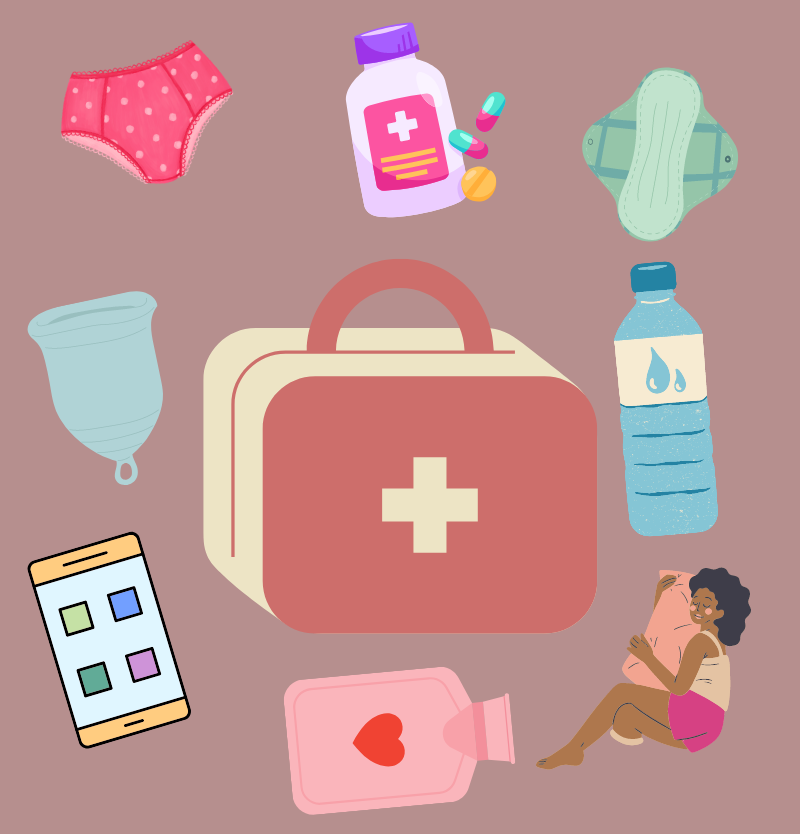
It’s That Time Again…
Going to work to teach is stressful already, but every month, Aunt Flo always has to come and make it a bit more stressful for a few days. There are so many things to worry about. We barely have time to go to the bathroom. Now adding another bathroom task just seems like too much. So, I just wanted to give a few tips on how to make those days a bit more manageable.
- Pain Management
Are menstrual cramps cramping your style? I’m sure they do, but they don’t have to be that bad. Learning how to manage your pain can be a game changer. I have dealt with very painful periods since I was a teenager, so this first tip is very near and dear to my heart. Let’s get into science first. Our bodies produce these hormonelike substances called prostaglandins. They are what trigger your uterine contractions to help shed the lining of the uterus. The more prostaglandins your body produces, the stronger and more intense your cramps will be. I have learned that if you start taking an anti-inflammatory medication such as ibuprofen (my favorite) or naproxen a couple of days before your period starts, they will help reduce the amount of prostaglandins your body produces. The fewer prostaglandins you have, the less intense your pain will be (fingers crossed). So, set yourself up for success and start popping the pills a few days early. Let’s be proactive instead of reactive. Then, you won’t break down and cry in front of your students (I have done this before ), snap at a student or colleague, or leave early because the pain is so bad. Another great option is heat. I either use a hot water bottle or an electric heating pad with adjustable settings. The heat helps your muscles relax and also increases blood flow to the abdominal area, which helps reduce pain. We also need to remember to stay hydrated. Making sure we are drinking water and other fluids helps reduce bloating. Our bodies retain water during our periods and bloating can lead to abdominal pressure which intensifies cramps. Drinking water helps to flush out retained fluids and reduce bloating. Any of these tips will hopefully make you more comfortable and help with your pain. Try one or try them all!
- Menstrual Cups
Picture this, you’re sitting at your kidney table or wherever you do small groups. You’ve been sitting for about 30 minutes, having the time of your life teaching students how to read and comprehend or figure out a math problem. You finally end your last group, you stand up, and all of a sudden there’s this huge gush ‘down there’. Oh no! Did you just ruin your pants? Did you look down at your chair to make sure you didn’t ruin that too? You can’t even run to the washroom to check, because there’s no one to cover your class for a few minutes. Now you have to wait for lunch, or your prep period, or for some random coworker to walk down the hall so you can ask them to pop in for a minute to watch your class while you run to the washroom. One thing I have done to avoid this situation is invest in a menstrual cup. Most people are confused at first, but it’s not that bad and in my opinion, it’s life-changing. Menstrual cups are medical-grade silicone cups that fit into your vagina to collect your menstrual flow. You insert them and remove them with your hands. This part grosses people out. Just make sure you wash your hands before and after. Once inserted it forms a seal to prevent leaks and it can stay there for up to 12 hours. It’s like that one infomercial about the ovens, “set it and forget it”. You can have this thing in for your entire teaching day, and not have to worry about anything. If your flow is heavy for the first couple of days, you may have to empty it sooner than 12 hours, but that’s nothing compared to the hassle of pads and tampons. There’s no loud, crinkly paper letting everybody know your business in the bathroom, there’s so much less waste for the landfills, pretty much 0 waste except for the packaging it comes in, you can not feel it, it’s like you don’t even have your period, and the risk for developing toxic shock syndrome (TSS) decreases. Menstrual cups may not be for everyone, but I highly recommend them. Amazon has lots of options, I currently use the brand Lunette. I have been using it since about 2014 and I can’t say enough good things about it. Give it a try!
- Emergency Kits
One day at work my period started earlier than I expected and caught me off guard, so I asked my closest coworkers if they had any extra pads, pantyliners, whatever. One TA pulled out this little bag and it had all of her essential items in there in case of emergencies. What a great idea! So, I started doing the same. It’s nice to know that you have what you need, just in case. Here are a few things I think would be helpful in your emergency kits:
- Extra, pads (cloth or disposable), pantyliners, tampons, or an extra menstrual cup
- Pain pills (Tylenol, Advil, Motrin, Pamprin, Midol, etc)
- Extra underwear
- Water – It’s important to stay hydrated, especially during your period. Being dehydrated can also lead to more severe cramping.
- A change of clothes (maybe keep sweats somewhere in your classroom)
- A heating pad – You can get the small ones that you fill with hot water or they have these adhesive ones made by Thermacare that you stick inside your underwear and they stay heated for up to 8 hours.
- Wet wipes – sometimes things can get a bit messy
- Period Tracker Apps
I first started using a period tracker when I was trying to conceive my first baby, but I realized it’s still a great tool to use even if you are not trying to have a baby. Tracking apps do just that. They track your period to better understand your cycle. The more you track the better it gets at predicting how your cycle will be. These tracking apps have greatly improved since 2011. They give so much more useful information, not just when your period will arrive or ovulation days. The information they provide comes in a variety of formats because as teachers, we all know that everyone learns differently. There are videos, articles, chats, charts and graphs, a digital assistant, courses, podcasts, and so many other great features. I am currently using the Flo app and I have the premium subscription which gives me access to all of those cool features I just mentioned. Flo gives information about
- Healthy eating and nutrition during your cycle – what to eat during each phase of your cycle
- Sexual health and well-being
- Fitness
- Disorders and Conditions – How can certain conditions affect your cycle
- Mental Health
I’m sure there are lots of period tracker app options in your phone’s app store. Check them out because the information they provide will definitely help you understand your body better and ultimately help you manage your cycle a lot smarter. In teaching, we like to work smarter, not harder. No reason why we can’t do it when it comes to our periods.
- Use Your Time
If your period is just too uncomfortable, painful, or draining, just take a sick day. It’s ok. Take time to refresh, renew, and rest. Take care of yourself. There could also be a medical reason for your uncomfortable periods. Schedule a doctor’s appointment. Many conditions may make your period hard to manage like endometriosis, premenstrual dysphoric disorder (PMDD), or uterine fibroids, and a medical professional is the only person who can help you manage them, not the people at work. I know we have lots of teacher guilt when we take time off. Some may even fear negative responses from the administration. Your principal being upset with you for taking time to care for yourself says more about them than it does about you. Isn’t it time for us to start thinking of ourselves, our health, and our well-being? We spend so much energy worrying about if the kids are ok, if the data is good, or if our instruction is top-notch. But, will all that matter if we aren’t well enough to do any of it? We are no good to our students or our school community if we can’t bring our best selves to work. There’s also that little matter of sub plans. We know it takes more work to prep for a sub than to just go to work not feeling well. If you can, have emergency sub plans already prepped and ready to go for those unexpected days off. That may alleviate some of the stress of taking off unexpectedly and having to race to throw some things together. Educators have to start putting themselves first, especially those of us who have a special visitor every month.



-
-
3 years
Tagged Breathe, Medidtation, Meditate, Parents, Self-care